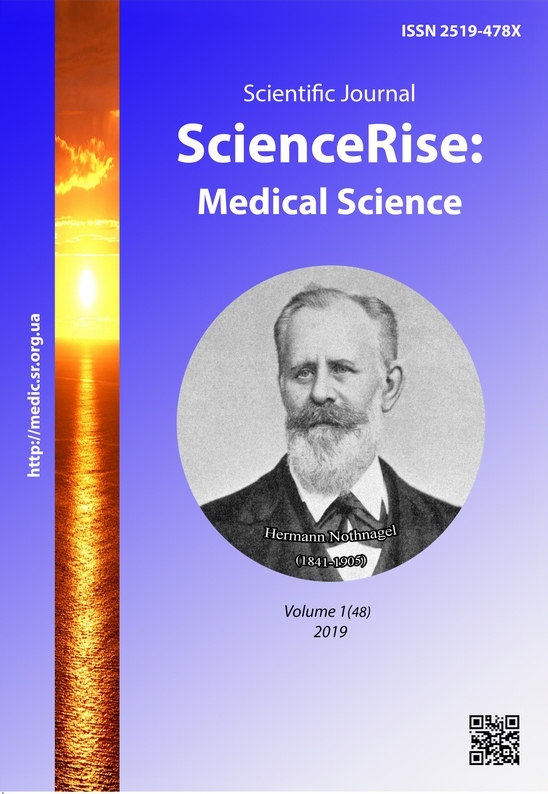Socio-demographic risk factors for the psychogenic anxiety-depressive disorders development in patients with pancreatitis
DOI:
https://doi.org/10.15587/2519-4798.2019.155660Keywords:
pancreatitis, anxiety, depression, psychogenic disorders, risk factors, socio-demographic factorsAbstract
When studying the socio-demographic factors of the risk of developing psychogenic anxiety and depression disorders in patients with pancreatitis, we used the results of a comprehensive study. The complex evaluation of socio-psychological and clinical risk factors for pancreatitis was analyzed, and a comprehensive analysis of socio-demographic characteristics, anxiety-depressive and neurotic symptoms in patients with pancreatitis has been performed. The article presents the socio-demographic factors that influence the development of mental disorders in acute recurrent pancreatitis.
The aim of the study was to identify socio-demographic features of psychogenic anxious and depressive disorders in patients with pancreatitis (acute and chronic) to improve the quality of life of this contingent of patients.
Materials and methods. The study was attended by 131 patients with recurrent pancreatitis, exclusion criteria in the study; age over 65, the presence of other somatic diseases, mental and behavioral disorders as a result of alcohol abuse, narcotic substances and substances not included in the state list of narcotic drugs, refusal of the patient from a psychiatrist's examination. Established factors associated with the development and severity of neurasthenia in patients with chronic pancreatitis. Statistical processing of the results of the study was conducted using the software package Statistica v.6.1.
Research results. The article presents the analysis of psychopathological symptoms in patients with pancreatitis, which revealed a number of features of the quantitative and qualitative structure of emotional disorders. The factors with which the development and severity of psychogenic anxiety-depressive disorders in patients with pancreatitis are noted is noted. The basic pathogenetic link of development of psychogenic anxiety-depressive disorders in patients with pancreatitis was revealed. Presented is a symptomatology that predominates in affective pathology in patients with pancreatitis.
Conclusions. The data of the main socio-demographic factors influencing the development of mental disorders in chronic recurrent pancreatitis, such as male sex, low frequency of appeals for medical aid during the year, absence of a family history of pancreatic diseases
References
- Löhr, J. M., Dominguez-Munoz, E., Rosendahl, J., Besselink, M., Mayerle, J. et. al. (2017). United European Gastroenterology evidence-based guidelines for the diagnosis and therapy of chronic pancreatitis (HaPanEU). United European Gastroenterology Journal, 5 (2), 153–199. doi: http://doi.org/10.1177/2050640616684695
- Capurso, G., Archibugi, L., Pasquali, P., Aceti, A., Balducci, P., Bianchi, P. et. al. (2017). Prevalence of chronic pancreatitis: Results of a primary care physician-based population study. Digestive and Liver Disease, 49 (5), 535–539. doi: http://doi.org/10.1016/j.dld.2016.12.024
- Babinets, L. S., Shevchenko, N. O. (2017). Aktualnist vikovoho aspekta klinichnoho perebihu i vedennia khvorykh na khronichnyi pankreatyt (ohliad literatury) [Actuality of the age-related aspect of clinical course and management of patients with chronic pancreatitis (literature review)]. Zdobutky klinichnoi i eksperymentalnoi medytsyny [Achievments of Clinical and Experimental Medicine], (4), 5–11. doi: http://doi.org/10.11603/1811-2471.2017.v0.i4.8318
- Nakai, Y., Sugita, M., Nakagawa, T., Araki, T., Ikemi, Y. (1979). Alexithymic Features of the Patients with Chronic Pancreatitis. Psychotherapy and Psychosomatics, 31 (1-4), 205–217. doi: http://doi.org/10.1159/000287332
- Nakai, Y., Araki, T., Takahashi, S., Shimada, A., Nakagawa, T. (1983). Chronic Pancreatitis as Psychosomatic Disorder. Psychotherapy and Psychosomatics, 39 (4), 201–212. doi: http://doi.org/10.1159/000287742
- Potiazhenko, M. M., Kitura, O. Ye., Nevoit, H. V., Sokoliuk, N. L., Nastroha, T. V. (2018). Vliyaniye lecheniya na uroven' trevozhnosti bol'nykh khronicheskim pankreatitom [Effect of treatment on the anxiety level in patients with chronic pancreatitis]. Web of Scholar, 2, 44–47.
- Ushakov, I. B., Lubavskaya, S. S., Batishcheva, G. A., Chernov, Y. N. (2016). Osobennosti terapii khronicheskogo pankreatita, assotsiirovannogo s trevozhno-depressivnymi rasstroystvami u rabotnikov zheleznodorozhnogo transporta [Features of therapy for chronic pancreatitis associated with anxious depressive disorders in railway workers]. Meditsina Truda i Promyshlennaya Ekologiya [Occupational Health and Industrial Ecology], 4, 31–35.
- Kutova, N. V. (2015). Porivnialnyi analiz depresyvnykh i tryvozhnykh staniv u patsiientiv z khronichnym pankreatytom biliarnoi ta alkoholnoi etiolohii [Comparative analysis of depressive and anxiety disorders in patients with chronic pancreatitis of biliary and alcoholic ethiology]. Ukrainskyi Visnyk Psykhonevrolohii [Ukrainian Herald of Psychoneurology], 23 (2), 56–60.
- Chen, H.-M., Chen, V. C.-H., Wang, T.-N., Lu, M.-L., Huang, Y.-C., Dewey, M. E. et. al. (2018). Diseases of the pancreas and suicide mortality: A nationwide nested case-control study among patients with mental health disorders in Taiwan. General Hospital Psychiatry, 50, 45–50. doi: http://doi.org/10.1016/j.genhosppsych.2017.09.008
- Madan, A., Borckardt, J. J., Barth, K. S., Romagnuolo, J., Morgan, K. A., Adams, D. B. (2013). Interprofessional Collaborative Care Reduces Excess Service Utilization Among Individuals With Chronic Pancreatitis. Journal For Healthcare Quality, 35 (5), 41–46. doi: http://doi.org/10.1111/jhq.12025
Downloads
Published
How to Cite
Issue
Section
License
Copyright (c) 2019 Irina Spirina, Yuliia Shevchenko, Andrii Shornikov

This work is licensed under a Creative Commons Attribution 4.0 International License.
Our journal abides by the Creative Commons CC BY copyright rights and permissions for open access journals.
Authors, who are published in this journal, agree to the following conditions:
1. The authors reserve the right to authorship of the work and pass the first publication right of this work to the journal under the terms of a Creative Commons CC BY, which allows others to freely distribute the published research with the obligatory reference to the authors of the original work and the first publication of the work in this journal.
2. The authors have the right to conclude separate supplement agreements that relate to non-exclusive work distribution in the form in which it has been published by the journal (for example, to upload the work to the online storage of the journal or publish it as part of a monograph), provided that the reference to the first publication of the work in this journal is included.









